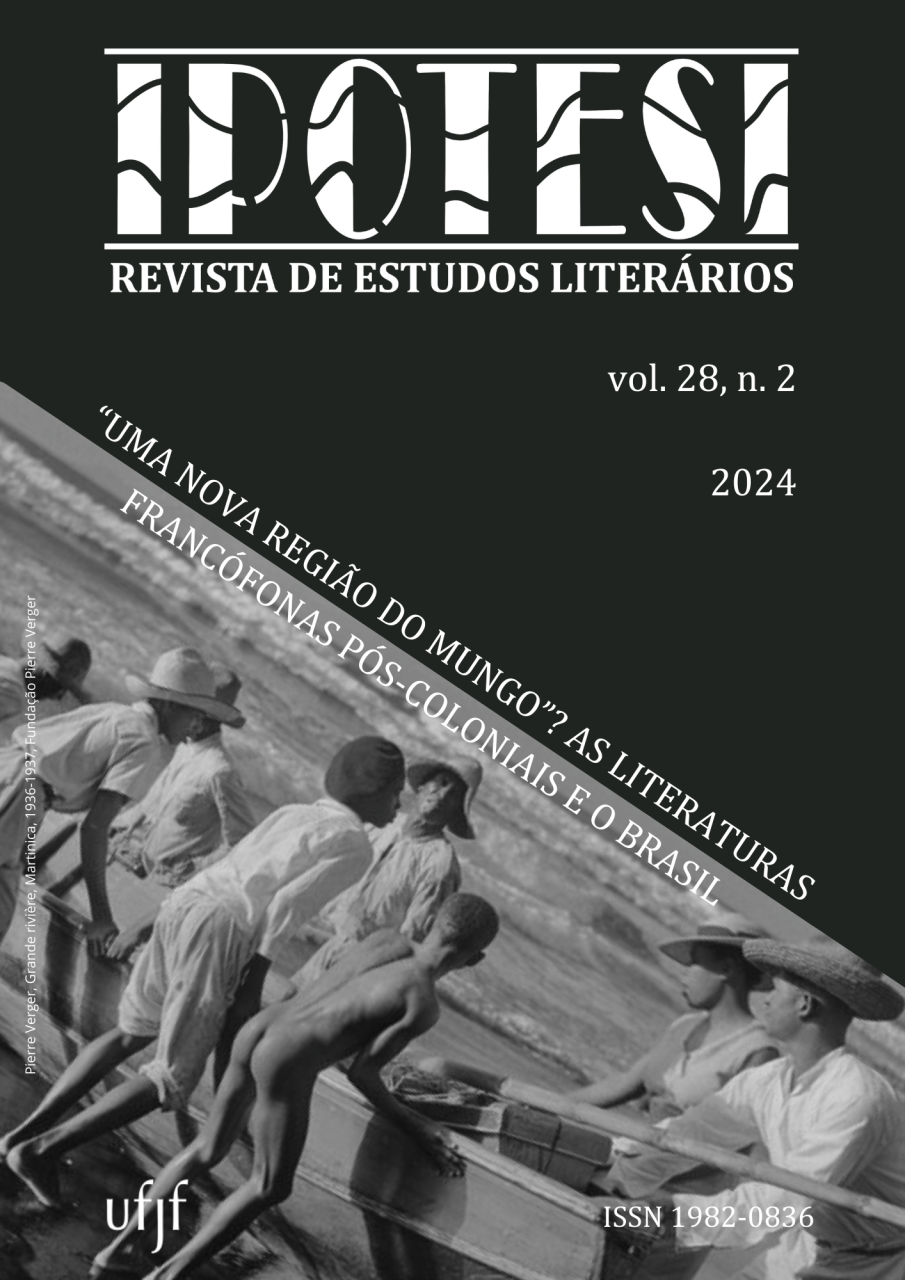Travessias estéticas das Áfricas francófona e brasileira: Colonialismo e (anti)negritude em Soleil, Ô e Compasso de espera
DOI:
https://doi.org/10.34019/1982-0836.2024.v28.46134Keywords:
Brazilian Cinema, Francophone cinema, African cinema, Antunes Filho, Med HondoAbstract
The global reach of modern colonial ideology has driven the production of highly productive systems of signification, such as racist and anti-black power devices. Their denunciations and challenges would manifest themselves in various forms and registers and, at the turn of the 1960s and 1970s, would find a high degree of expressiveness in cinematographic language. Fruits of this protest movement, the audiovisual works of Med Hondo, in the African and French context, and of Antunes Filho, in the Brazilian context, were notable for their critical thematization of the anti-black paradigm of the modern world. Adopting as a theoretical framework the studies of Wilderson (2021), Silva (2022) and Deleuze (1990), we propose an individual and comparative examination of the films Soleil, Ô (1967), by Med Hondo, and Compasso de Espera (1973), by Antunes Filho. From this comparison, we believe it is possible to elucidate possible confluences of the anti-black experience in the aesthetic formalizations carried out in two distinct but very similar contexts, judging by the similarity of the policies of denial of racism crystallized in the myths of egalitarian France and the Brazilian racial paradise.
Downloads
References
CARNEIRO, Sueli. Dispositivo de racialidade: a construção do outro como não ser como fundamento do ser. São Paulo: Zahar, 2023.
COMPASSO de espera. Direção de Antunes Filho. São Paulo: Antunes Filho Produções Artísticas Ltda, 1973. 98 min.
DELEUZE, Gilles. A imagem-tempo. São Paulo: Brasiliense, 1990.
DESBOIS, Laurent. A odisseia do cinema brasileiro: da Atlântida a cidade de Deus. São Paulo: Companhia das Letras, 2016.
FANON, Frantz. Os condenados da Terra. Rio de. Janeiro: Zahar, 2022.
FANON, Frantz. Pele negra, máscaras brancas. São Paulo: Ubu, 2020.
GLISSANT, Édouard. Poética da Relação. Trad. Marcela Vieira e Eduardo Jorge de Oliveira. Rio de Janeiro: Bazar do Tempo, 2021.
GUTBERLET, Marie-Hélène; KUSTER, Brigitta (Org.). 1970-2018: Interviews with Med Hondo. [s. l.]: Archive Books/Arsenal – Institut für Film und Videokunst, 2021.
MELO, Alfredo Cesar. Por um comparativismo do pobre: notas para um programa de estudos. Revista Brasileira de Literatura Comparada, Salvador, v. 15, n. 23, p. 9-30, 2013.
NASCIMENTO, Abdias. O genocídio do negro brasileiro: Processo de um racismo mascarado. São Paulo: Editora Perspectiva, 2016.
PATTERSON, Orlando. Slavery and the Social Death: A Comparative Study. Cambridge: Havard University, 1982.
PEREIRA, Allan K. A condição sem análogo da antinegridade: uma introdução ao Afro-Pessimismo. In: MIRANDA, Fernanda Rodrigues de; ASSUNÇÃO, Marcello Felisberto Morais de (Orgs.). Pensamento afrodiaspórico em perspectiva: abordagens no campo da História e Literatura. Porto Alegre: Editora Fi, 2021.
QUIJANO, Aníbal. Colonialidade do poder, eurocentrismo e América Latina. In: LANDER, Edgardo (org). A colonialidade do saber: eurocentrismo e ciências sociais. Buenos Aires: CLACSO, 2005.
SILVA, Denise Ferreira da. Homo Modernus: Para uma ideia global de raça. Rio de Janeiro: Cobogó, 2022.
SILVA, Mateus Araújo. Pedro Costa e sua poética da pobreza. Devires, Belo Horizonte, v. 5, n. 1, 2008, p. 26-45.
SOLEIL, Ô. Direção de Med Hondo. Paris: Les Films Soleil Ô, 1970. 104 min.
WILDERSON, Frank B. Afropessimismo. São Paulo: Todavia, 2021.
Downloads
Published
Issue
Section
License
Copyright (c) 2024 IPOTESI – REVISTA DE ESTUDOS LITERÁRIOS

This work is licensed under a Creative Commons Attribution 4.0 International License.










